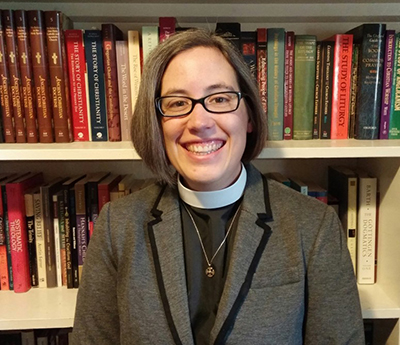SOUL MATTERS
★ ★ ★ ★
WHAT WE NEED

By Reverend Rachel Kessler
One of the undeniable facts about having kids is that you are forced to get over a fear of asking for help. I think one of my lowest moments in parenthood to date was when my husband was away for a weekend. At one point I found myself calling my senior priest near midnight looking for his wife to share some wisdom about how to get a screaming 18-month-old to go to sleep. In our current situation, my family and I live in a community-oriented college town where we regularly find ourselves relying on friends, neighbors, and other parents to make our lives manageable.
It is hard to accept offers of help. It is even harder to reach out and initiate the call for a little extra assistance from time to time. No one likes to admit that we have limitations to what we can manage on a day-to-day basis. That desire to be self-sufficient is a powerful force.
There has been no shortage of commentary on the perceived heartlessness at the core of so much legislation (or, at least, attempted legislation) coming out of Washington, D.C. at the moment. Selfishness and corporate greed seem to be the benchmarks that define the agenda of the current White House administration—whether on issues such as the utter refusal to address the reality of climate change, the push to overturn Net Neutrality protections, or the current battle to repeal the Affordable Care Act. Even President Trump himself has infamously referred to the Republican-backed heath care plan as “mean.”
No doubt self-interest does feed into our political situation at the moment. Both our elected representatives and the voters who put them in office are out to ensure their own well-being. Individuals push against environmental protections because they seem to put restrictions on how freely we can live our own lives. Young, healthy people push against health care reform, demanding to know why their costs should increase to offset the astronomical rates charged to someone with a long-standing chronic condition. It is impossible to deny that our “selfishness” fuels so much of the toxic nature of our current political reality.
That said, as easy as it is (especially for those of us who champion progressive causes) to rail against the “selfishness” we perceive in our political opponents, I cannot help but wonder if there is something else at work in the American political landscape. At the core of American rugged individualism is not just a desire to protect what is our own, but also to prove to ourselves and to one another that we can make it on our own. The notion of accepting anything perceived as “charity” from friends or family is challenging enough for someone raised on the “can-do” entrepreneurial spirit of the American Dream to accept. The notion of accepting anything given for free from an entity as faceless or remote as the bureaucratic arm of the state is to many minds unthinkable.
There is certainly nothing immoral about having a strong, positive work ethic and a sense of personal responsibility. But there is something broken about a culture that has bought into an “everyone for themselves” mentality that leaves the most vulnerable without necessary safety nets and renders large segments of the population distrustful of one another. Especially when that distrust leads to fear of anyone perceived to be outside the “norm” or a “threat to our way of life.” We cannot deny that the culture of self-reliance and lack of concern for others has a disproportionately negative impact on people of color, immigrants, and religious minorities (particularly Muslim Americans).
The ironic reality is actually that the more we cling to our own sense of independence and autonomy the more precarious and impoverished our lives become. The more I am determined that I can go it alone as a parent, the more exhausted and frustrated I become with my life and with my daughter (who is a wonderful kid, if very… energetic). On the other hand, when I actually let go of my own pride and sense of self-sufficiency in order to accept the help that so many people in my social circle offer willingly, my life becomes so much more manageable. Most importantly, though, acknowledging my need for others and accepting that help does not just make my own individual life better. It does not just give me the freedom to be a little bit more relaxed and a little bit put together. It also gives me the freedom to turn around and give that help to other people. A sense of self-satisfaction that assures us that we can take care of ourselves is great. But it pales in comparison to the freedom and capacity to turn around and be able to offer help to our neighbors when the time comes.
What type of world might we live in if we could all move past the “I can do it myself” mentality and trust that others are looking out for us? And how would the world be transformed if we moved past the “I’ve got mine” mentality, and started to think about how we can ensure that we all—us, our neighbors, our fellow citizens, our fellow human beings—have what we need?

Reverend Rachel Kessler is a college chaplain and Episcopal priest. She enjoys commenting on the intersection of faith and popular culture.
























Trackbacks/Pingbacks